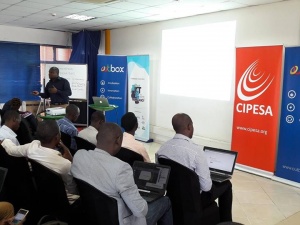The First Showcase of Civic Tech Tools in Uganda - CIPESA and Outbox

Civic tech tools have gained prominence in the recent past, helping Civic Society Organisations (CSOs) perform their work in fighting corruption and promoting accountability. A number of these tools have been developed but not widely used. On the other hand, there is need to explore different opportunities that software developers can tap into to develop more civic tech tools that match the needs of CSOs.
To showcase the social and civic tech tools within the local Ugandan ecosystem, the Collaboration on International ICT Policy for East and Southern Africa (CIPESA) in partnership with Outbox held their first event in Uganda on Tuesday 4th July 2017, aimed at creating awareness among civil society actors and pushing for the adoption of civic technologies.
Under the ICT4Democracy in East Africa initiative, the events across Kenya, Tanzania and Uganda are aimed at increasing knowledge and awareness of civic and social tech and promoting opportunities for collaboration between transparency, accountability and human rights actors, and technologists.
This event attracted participants from Government, Civil Society Organisations (CSOs), Software developers, Journalists, Accountability space, among others, with amazing presentations from different actors.
After an introduction from Ashnah Kalemera, the project lead and program manager at CIPESA, Richard Zulu the Co-founder of Outbox and also the Lead, Code4Uganda, gave an overview of civic tools and relevance in accountability, highlighting some of the civic tools being embraced within the African region, and their impact so far.
Other tools that were showcased include the following;
1) M-Omulimisa; an application that was formerly developed to link farmers and extension workers. The application has now been transformed to monitor service delivery in Eastern and Northern Uganda. Launched in July 2016, the platform enables users to report service delivery gaps to local authorities by sending a message to the short code 8228 with the sender’s location. This was presented by Ivan Pino and Daniel.
2) Parliament Watch; that monitors and analyses proceedings of the Parliament of Uganda. Parliament Watch uses social media such as Periscope, Facebooklive to hold digital dialogues and engage Members of Parliament on pressing issues. They also use other conventional methods like community dialogues to link members of parliament with their constituencies.
3) User.Ug; an electronic system for monitoring construction works in Kampala City. Mr. Haroon Kakembo talked about an innitiative by Kampala City Council, developing the Uganda System for Electronic open data Records(USER) to support tracking of City Council projects, and the ability to offer feedback on them.
4) Yogera, a citizens engagement platform that connects citizens to their government and increase government responsiveness to raised issues in communities. Gilbert Arinda, shared how Yogera is improving service delivery to the citizens through their platform.
The government was represented by Mr. Michael Ocero the Assistant Commissioner for Informattion Technology, Ministry of ICT and National guidance, showing us how the government is approaching civic tech. He also talked about the support that government has in place for innovations.
Crowning the event was a rich panel session comprised of experienced panelists from civil society space, journalism, information technology space and government; Raymond Besiga (Developer- Spark plug), Lillian Nalwoga (CIPESA), Gerald Atenyi (Lecturer - Department of Journalism, Makerere), Joshua Akandwanaho, the Applications Solutions Architect at NITA-U, discussed Challenges, opportunities, and possible improvements that can be made on civic tools and by key players. This session was moderatd by Brian Lamtoo.



Add new comment